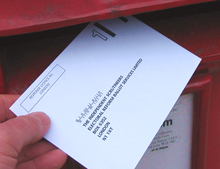Last few days in BBC ballot

There's still time to post ballot forms back to ERBS, the scrutineers.
The ballot, in protest at DG Mark Thompson's plans for cuts and privatisation, is being run by Electoral Reform Ballot Services, whose automated counting facility in North London can accept returns right up to the last minute.
Any forms received by noon on May 11 will count towards a vote which the unions hope will send a clear message to Mark Thompson that, in the view of staff, his cuts go too far, too fast.
Download union reminder about closing date [330k pdf].
Since balloting began on April 22, two developments have underlined union fears about the dangers to staff of the Director-General's plan to sack, outsource, or privatise a quarter of BBC jobs.
On April 28, BBC People, which includes areas like health & safety, training, and HR, confirmed details of its reorganisation under which 50% of all jobs would go. Nearly 200 of these would be redundancies, while the remaining 280 staff would be handed to an outsourced supplier.
Areas affected by outsourcing in BBC People include recruitment, HR advice, engineering training, occupational health, and contracts department.
In the official notification sent to the unions, the BBC said that: "...line managers will claim greater ownership for their own HR and devlopmental needs", confirming predictions that the run-down of the BBC's back-office will mean more work for staff in front-line jobs.
Further plans for programme-making staff and line managers to pick up extra work are expected towards the end of this year, when the BBC's finance division is due to announce redundancies for 33% of its staff, and more outsourcing among the remainder.
Management in BBC People have stated that they are "committed to avoiding compulsory redundancies", but there is no promise that all cuts will be voluntary.
Nor have any guarantees about future pension rights been given to those BBC People staff who could be outsourced. Management have stated categorically that: "the BBC's pension arrangements do not TUPE transfer" [to any new employer].
"Future pension provision will be a matter of commercial negotiation," say management, "and it is too early to provide any details or to speculate on the full range of options that may be available to you".
Pension issues have featured in the second development since balloting began, this time in BBC Resources Ltd, a wholly-owned subsidiary planned to be sold off with BBC Broadcast.
In an e-mail to all Resources staff, Managing Director Mike Southgate confirmed that their right to continue in a final salary pension scheme after the sale "will form part of the negotiations" with any new owner, and was not, at this stage, guaranteed.
A firm promise that staff facing privatisation or outsourcing would be guaranteed a proper pension scheme was one of the demands rejected by Mark Thompson in April, precipitating the strike ballot.
Southgate drew attention to new government regulations on transfers of employment, which oblige new employers to put at least basic pension provisions in place for staff.
However, they can fulfill their legal duties to newly-acquired staff by putting 6% of payroll into money-purchase pension schemes. This compares badly with the full cost of the BBC's final salary pension scheme which is 24.5% of payroll. The benefits available in schemes saving as little as 6% of the wage bill are significantly inferior to those on offer from the BBC's own scheme.
A parallel e-mail to staff in BBC Broadcast offered more assurance about a new employer offering a final salary pension scheme, but stopped short of giving concrete guarantees about the future of staff terms and conditions.
Another of the demands turned down by Thompson last month was that any staff facing privatisation or outsourcing should be given guarantees of job security, and protection of their terms and conditions, including the BBC redundancy formula.
Union representatives will be reviewing these new developments when they meet to discuss the outcome of the ballot on May 12.
Apart from encouraging existing members to use their vote in the ballot, BECTU has put arrangements in place for late joiners to vote, provided they sign membership forms and contact head office by the end of Friday May 6.
Since Mark Thompson announced his plans in December last year more than 1,000 new members have joined BECTU, and the NUJ has reported similar growth in membership.
